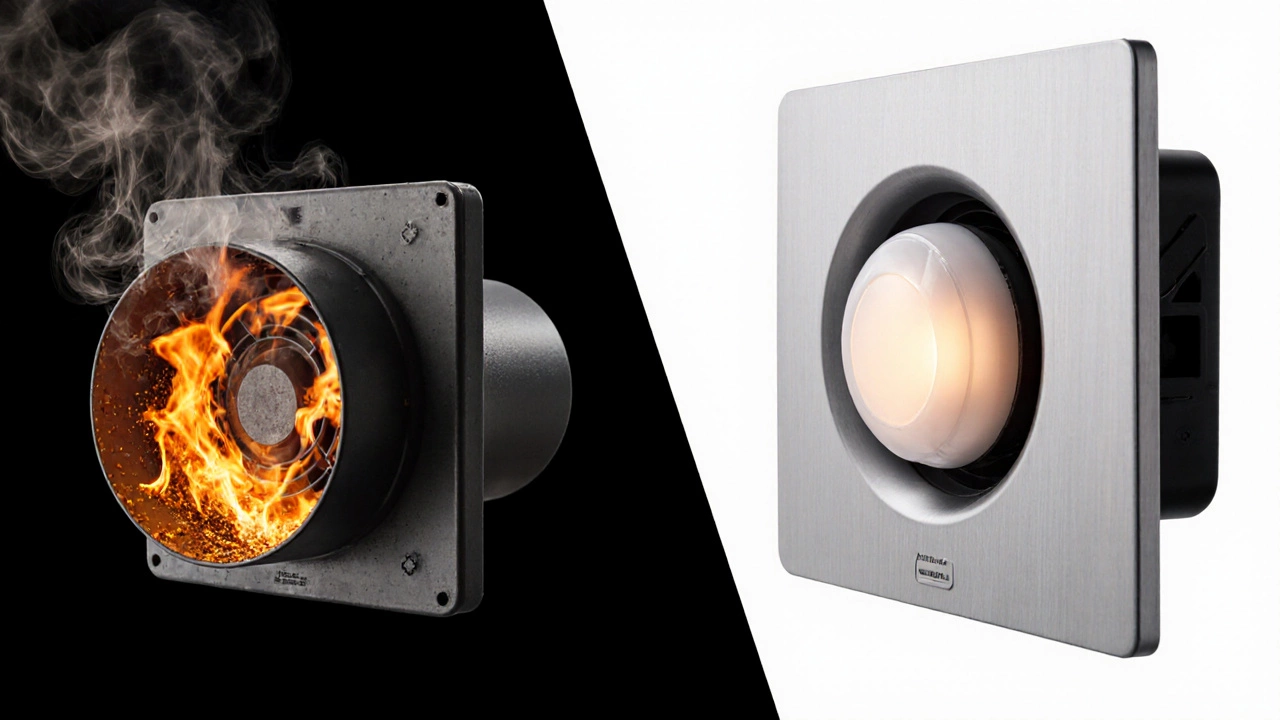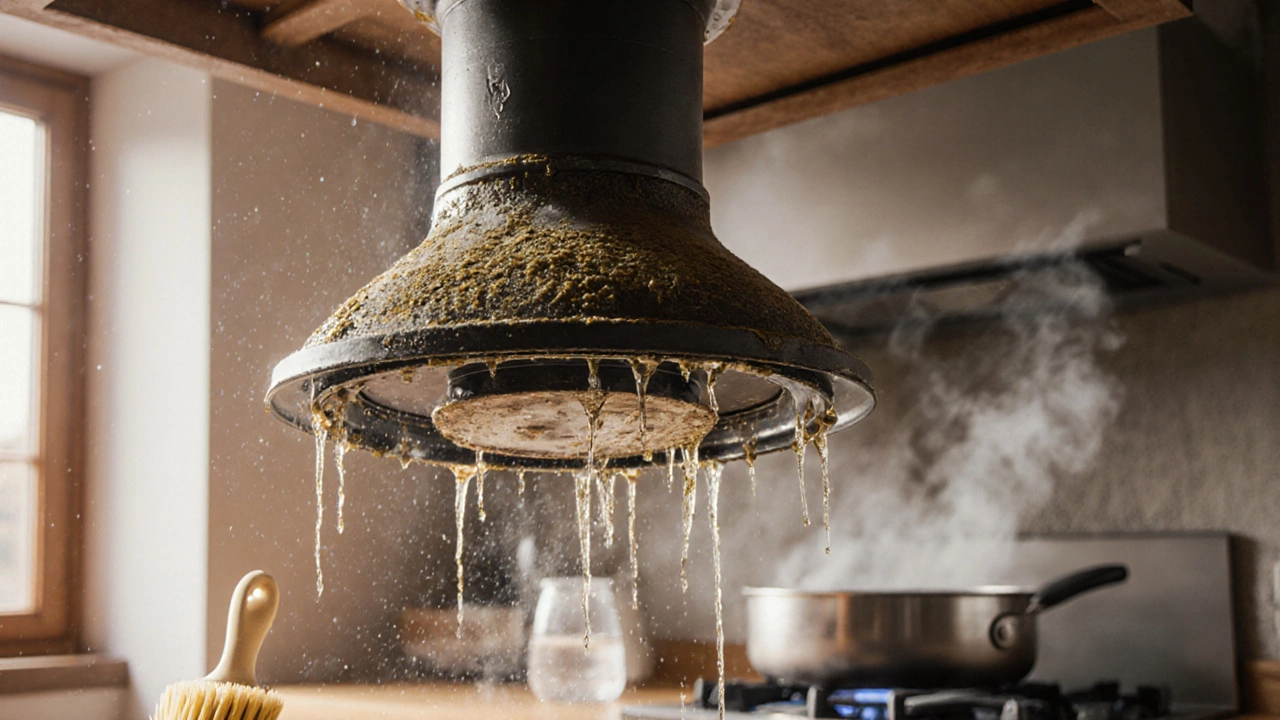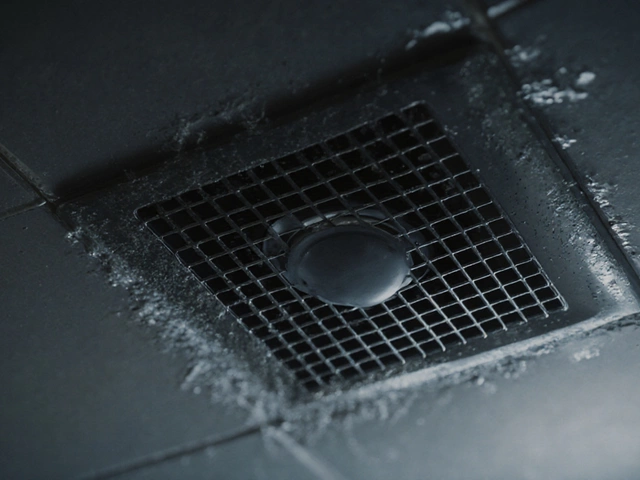Extractor Fan Maintenance Calculator
Determine how often you need to clean your extractor fan based on your usage patterns and identify potential risks.
Your Fan Details
Maintenance Recommendations
Enter your details to see maintenance recommendations
Ever notice your extractor fan getting louder? Or maybe the steam from your shower lingers longer than it should? That’s not normal. Most people assume extractor fans just run and forget about them-until they stop working. But here’s the truth: extractor fans need regular maintenance, just like your fridge or oven. Skipping it doesn’t just make them noisy. It can lead to mold, poor air quality, and even fire risks.
Why extractor fans get dirty faster than you think
Extractor fans pull air out of your kitchen or bathroom, but they don’t just move air. They pull grease, moisture, dust, hair, and soap residue along with it. In a kitchen, every time you fry an egg or boil pasta, tiny oil particles float into the air. The fan catches them. Over time, that grease builds up on the blades, motor, and housing. In bathrooms, humidity turns into condensation, which mixes with soap scum and skin cells. That gunk sticks to everything inside the fan unit.
It doesn’t take long. In a busy kitchen, a fan can become 30% less efficient in just six months. A 2023 study by the Australian Building Codes Board found that 68% of residential extractor fans in homes over five years old had visible grease buildup inside. That’s not just a cleaning issue-it’s a performance killer.
Signs your extractor fan needs cleaning or repair
You don’t need a professional to tell you something’s wrong. Your senses will. Here’s what to watch for:
- The fan sounds like a jet engine instead of a quiet hum
- Steam or smoke stays in the room longer than 10 minutes after cooking or showering
- You notice a musty smell even after cleaning the bathroom
- The fan vibrates or wobbles when it turns on
- Dust builds up on the grille faster than usual
If you see two or more of these signs, it’s not just dirty-it’s failing. Grease buildup makes the motor work harder. That increases energy use and shortens the motor’s life. A clogged fan can overheat. In extreme cases, that’s how kitchen fires start.
How often should you clean your extractor fan?
There’s no one-size-fits-all answer, but here’s a simple rule based on usage:
- Every 3 months: Clean the grille and filters if you cook daily (especially frying or roasting)
- Every 6 months: Clean the fan blades and housing if you cook moderately (3-4 times a week)
- Once a year: Deep clean the entire unit, including the ductwork, if you rarely cook or only use the fan for bathroom ventilation
And yes-bathroom fans need cleaning too. Even if you don’t cook in there, humidity and soap buildup can clog the motor. In humid climates like Brisbane, that’s even more critical.

How to clean your extractor fan (step by step)
You don’t need special tools. Just a few basics: screwdriver, mild detergent, soft brush, microfiber cloth, and gloves.
- Turn off power at the circuit breaker. Safety first.
- Remove the grille or cover. Most snap off or are held by screws.
- Take out the metal grease filter (if your model has one). Soak it in hot, soapy water for 20 minutes. Scrub gently with a brush. Rinse and dry completely.
- Wipe down the inside of the housing with a damp cloth and mild cleaner. Avoid harsh chemicals-they can damage plastic or paint.
- Use a soft brush or old toothbrush to clean the fan blades. Grease sticks like glue. Be patient.
- Check the duct opening behind the fan. If you can reach it, wipe out any visible debris. Don’t try to snake the duct yourself unless you’re experienced.
- Reassemble everything. Make sure the filter is dry before putting it back.
- Turn the power back on and test the fan. It should run quietly and pull air strongly.
If the fan still sounds rough or doesn’t move air well after cleaning, the motor might be worn out. That’s when repair or replacement is needed.
When to replace instead of repair
Not every noisy fan can be fixed. Here’s when it’s time to swap it out:
- The motor hums but the blades don’t spin (likely seized bearings)
- There’s visible rust or melted plastic inside the housing
- The fan is over 10 years old and uses more than 40 watts
- Replacement parts are hard to find or cost more than 60% of a new unit
New extractor fans are more efficient, quieter, and smarter. Modern models use DC motors that use up to 70% less energy. Some even have humidity sensors that turn on automatically. For under $150, you can get a reliable unit that lasts 15+ years with minimal maintenance.

What happens if you never clean it?
Ignoring maintenance doesn’t just mean a noisy fan. It means:
- Mold growth: Moisture trapped in dirty ducts creates perfect conditions for black mold. That’s a health risk, especially for kids or people with asthma.
- Increased energy bills: A clogged fan works harder. That can add $50-$100 a year to your electricity bill.
- Fire hazard: Grease is flammable. In rare but documented cases, built-up grease in kitchen fans has ignited during high-heat cooking.
- Reduced home value: Buyers notice poor ventilation. A smelly kitchen or damp bathroom can drop your home’s appeal.
In Brisbane’s humid climate, the risk of mold is real. The Queensland Health Department reports that over 1,200 cases of respiratory issues linked to indoor mold were recorded in 2024-many tied to poorly maintained ventilation systems.
Pro tips for longer fan life
- Run the fan for at least 20 minutes after cooking or showering. That clears moisture before it settles.
- Use a range hood with a grease filter if you fry often. It catches most oil before it reaches the fan.
- Don’t cover the fan with a decorative grille. It blocks airflow and traps dirt.
- Check the outside vent cap. Birds, leaves, or spider webs can block the exhaust outlet.
- Label your calendar. Set a reminder every 3 months to check the filter.
Simple habits like these can double the life of your extractor fan. And they cost nothing but a few minutes.
Do extractor fans need cleaning if they’re in the bathroom?
Yes. Bathroom extractor fans pull in moisture, soap residue, and skin cells. Over time, this builds up inside the unit and on the blades, reducing airflow and creating mold risks. Clean them every 6 months if used daily, or at least once a year.
Can I clean my extractor fan with vinegar?
Vinegar works well for light grease and mineral deposits, but not heavy kitchen grease. For stubborn grease, use warm water and dish soap. Vinegar can damage plastic parts or rubber seals over time. Stick to mild detergent for safety.
Why is my extractor fan so loud after cleaning?
If it’s louder after cleaning, something might be misaligned. Check that the fan blades are securely attached and not bent. Make sure the housing is fully reassembled. A loose part can cause vibration. If the noise continues, the motor bearings may be worn out and need replacement.
How do I know if my extractor fan is powerful enough?
For kitchens, you need at least 100 liters per second (L/s) of airflow. For bathrooms, 15-25 L/s is enough. Check the label on the fan-it should list the airflow rating. If it’s below that, or if you’re still getting steam buildup, it’s underpowered.
Should I replace my extractor fan or just repair it?
If the fan is over 10 years old, or if repair costs exceed 60% of a new unit, replace it. Modern fans are quieter, more energy-efficient, and come with features like timers and humidity sensors. A new unit costs $80-$200 and lasts 15+ years with basic care.
If your extractor fan isn’t working right, don’t wait for it to fail completely. A quick clean every few months saves money, keeps your air clean, and prevents bigger problems down the line. It’s one of the easiest maintenance tasks in the house-and one of the most overlooked.





